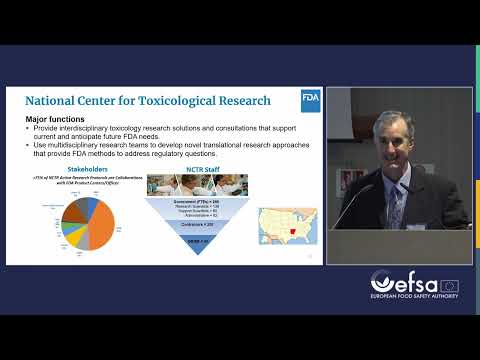Advisory Group on Data
Background
The Advisory Group on Data (AGoD) is a discussion group of the EFSA Advisory Forum set up in 2021 to answer various challenges in the food safety data system.
The group is composed of representatives of the Advisory Forum (on a voluntary basis), technical experts delegated by Advisory Forum members, EFSA staff and a representative of the European Commission. As of 2024 the participating countries are: Austria, Croatia, Denmark, Finland, France, Germany, Hungary, Italy, Ireland, Netherlands, Norway, Portugal, Sweden, and Switzerland.
It meets around seven times per year, of which 4 meetings take place back-to-back with the Advisory Forum meetings.
Latest
The Chair of AGoD updated Member States on the group's progress and presented its Roadmap 2024-2027, at the 94th Advisory Forum meeting on 4-5 December 2024.
EFSA and AGoD held a symposium dedicated to exploring the transformative impact of Artificial Intelligence ( AI The adequate intake (AI) is a dietary recommendation used when there isn't enough data to calculate an Average Requirement. An AI is the average nutrient level consumed daily by a typical healthy population which is assumed to be adequate for the population's needs) technologies within the food safety ecosystem A community of living organisms in conjunction with non-living components (e.g. air, water and mineral soil). A healthy ecosystem is a finely balanced system where animals, plants and microbes live in harmony with their environment in Parma on 23-24 October 2024.
The discussions were wide-ranging and included the opportunities and requirements for developing and implementing AI systems in food safety. Leading experts provided insights into their experiences with AI and data management in food safety. It was also a unique forum in which to exchange project ideas, network with peers, and collaborate on innovative solutions.
Presentations and background documents are available on the symposium page where you also find videos of the plenary sessions from EFSA's YouTube channel (see opening session below).

Milestones
2024
October
EFSA holds a symposium exploring the impact of Artificial Intelligence (AI) technologies on EU food safety
October
AGoD members finalise the Group’s Roadmap 2024-2027
2023
June
First Member State-led projects take off under EFSA Focal Point framework
2022
AGoD sets up its sub-working groups
2021
November
AGoD develops project ideas to resolve pain points in the data transmission process from Member States to EFSA
April
Advisory Forum sets up AGoD on the basis of one of the Task Force’s recommendation
2020
September
Task Force for Data Connection and Data Modelling issues its Recommendations
2018
September
EFSA Advisory Forum establishes a Task Force on Data Collection and Modelling
Objectives and tasks
The mission of the group is to identify and launch tangible projects solving the most pressing pain points of the Member States and bringing benefits to the European food systems data and risk assessment A specialised field of applied science that involves reviewing scientific data and studies in order to evaluate risks associated with certain hazards. It involves four steps: hazard identification, hazard characterisation, exposure assessment and risk characterisation community.
The group is the guardian of the EFSA Advisory Forum Task Force on Data Collection and Data Modelling’s data-related recommendations, maintaining coherence among different actions, overseeing harmonisation efforts and ensuring added value for multiple Member States. The Task Force’s recommendations covered four key areas: Data Reporting, Data Modelling, IT Architecture and Data Analysis, plus recommendations cutting across the four areas.
The Group is a governance body informing the strategic prioritisation and funding of data related projects emanating from the Task Force recommendations. It acts as a think tank providing input on project idea generation linked to Advisory Forum recommendations and as a channel providing access to knowledge, expertise, competencies and staff in Member States.
The group has four subgroups to foster discussions on a more detailed and technical level:
- Tools and Ecosystems - focuses on: collaborative development and sharing of tools and technology related to data collection and connection, data architecture, and process automation in the food safety ecosystem. The group will also serve as a think tank for data related knowledge management questions and enhancing platform- and ecosystem thinking throughout the wider food safety data community.
- Innovation - focuses on: enhancing services using new data streams, big data and computational analysis; developing and/or implementing new algorithms (predominantly based on Artificial Intelligence [AI] methods); using AI-based solutions in a risk analysis framework; trust, legal, ethical and transparency questions of AI-based and other advanced computational solutions; exploring the use of traceability The ability to track the journey of a foodstuff or ingredient through all stages of production, processing and distribution data and other new data streams (structured and unstructured); new approaches in food consumption and composition data collection.
- People and Capacity – focuses on: initiatives aimed at achieving the required level of data literacy through data-related education activities, including the European Food Risk Assessment fellowship programme, capacity-building initiatives, EU datathons and other regular and ad hoc training opportunities; discussions on encouraging future training and recruitment efforts in food safety institutions to focus on increasing data analytical capacities; supporting datathons and crowdsourcing activities to encourage use of food safety data and virtuous spiral feedback; organising an annual food safety data science conference; sharing good practices on techniques and coding languages, upskilling and training efforts.
- Data Management - focuses on: all aspects of data management including topics related to data models and catalogue terminologies, data quality and data analysis and visualisation. Data modelling and terminology includes discussions on ontologies, data models, data catalogues and interoperability questions. The data quality part comprises issues on both sides: data collection (harmonisation of standards, evaluation of quality criteria) and the usage of any data, possibly not perfect data. Data analysis and visualisation aims at building wider access to and broader exploitation of data and analytics in the food safety ecosystem.